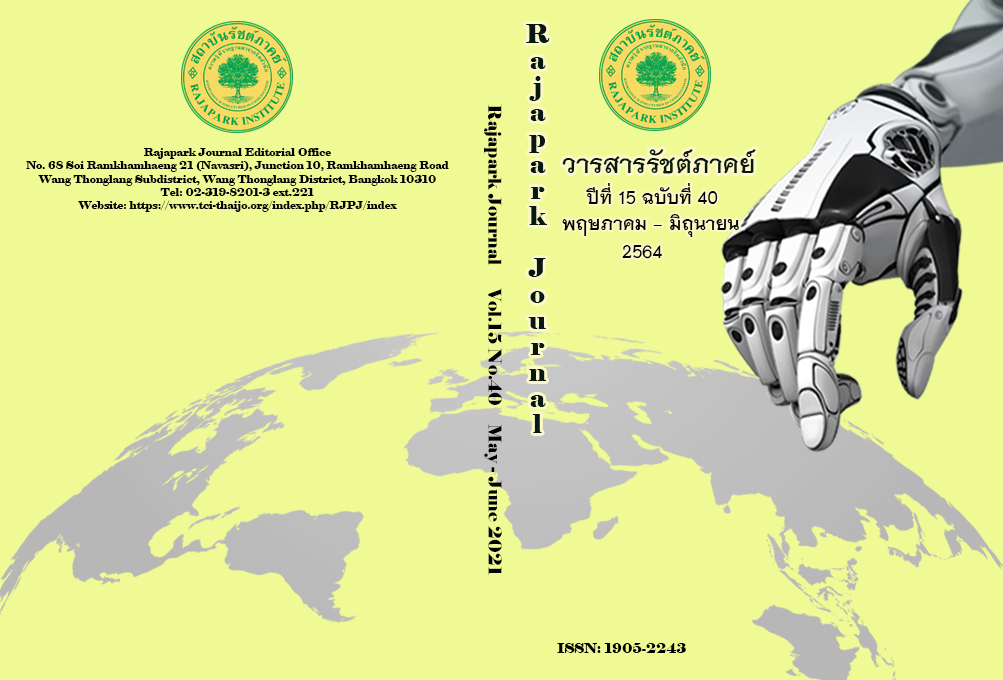Current Situations, Desirable Situations and Guidelines for Developing Digital Technology the School of Nakhon Phanom Primary Educational Service Area Office 1
Main Article Content
Abstract
This research aims to (1) study the current and desirable conditions, (2) to study the need for digital technology. (3) Guidelines for Developing Digital Technology The School of Nakhon Phanom Primary Educational Service Area Office 1. It is research and development The sample size was determined by comparing the tables of Krejcie and Morgan. The sampling was randomly composed of 60 school directors, head of the academic group, budget, personnel administration. And general administration of 60 people per group, totaling 300 people There were 4 research instruments: (1) Current Status Questionnaire for Digital Technology Use for Management (2) Desirable Condition Questionnaire for the Use of Digital Technology for Management (3) Structured Interview Questionnaire (4) Evaluation Form. Feasibility and feasibility of the development approach. The research results showed that (1) the current state of digital technology use Overall is at a high level. The aspect with the highest average was computer usability. Desirable condition of using digital technology Overall at the highest level The aspect with the highest average is the functionality for safety. (2) Necessary Needs of Digital Technology The highest average was the use of presentation programs and (3) the development of digital technology. For the management of educational institutions, it was found that it was appropriate and possible overall at a high level, for example, schools should use Google sites to store various documents.
Article Details
Views and opinions appearing in the Journal it is the responsibility of the author of the article, and does not constitute the view and responsibility of the editorial team.
References
Boonkhantinat, A. (2019). Development of digital skills for government teachers and educational personnel. Journal of The Teacher Civil Service and Educational Personnel, 39(1), 5-8.
Bunyajitradulya, N. (2014). Principles and Theories in Educational (3rd ed.). Bongkok: Trironnasan.
Jitsupa, J. (2013). Information and Communication Technology Security in Education. Journal of Vocational and Technical Education (JVTE), 3(6), 34-42.
Kanjanawasee, S. (2005). A Comparison of the Quality of Multiple-Choice Tests Under Various Number-Right Options, Response Methods, and Scoring Procedures. Journal of Research Methodology, 18(2), 181-192.
Kheawnamchum, J. (2020). Research for learning development. Nakhon Phanom: Faculty of Education, Nakhon Phanom University.
Krejcie, R. V., & Morgan, D. W. (1970). Determination sample size for research activities. Education and Psychology Measurement, 30(3), 607-610.
Makam, J. (2014). An Analysis of Thai Word Processing Program. Master of Education (Audio-Visual Education). Chulalongkorn University.
Nakhon Phanom Primary Educational Service Area Office 1. (2019). Annual Government Action Plan 2019. Retrieved from http://www.nkp2.go.th/
Phonpoch, D. (2002). Role of School Administrators According to the Spirit of the National Education Act 1999. SWU Educational Administration Journal. 1(3), 28-31.
Phumpuang, K. et al. (2020). The Development of E-Learning Model by Collaborative Learning on Social Media to Develop Information Literacy Skills for Undergraduate Students of Educational Faculty. Journal of Education Naresuan University, 22(1), 29-43.
Sriputtarin, S. (2020). Strategies for Digital Skills Development of the School Administrator in Basic Education. Nakhon Phanom: Faculty of Education, Nakhon Phanom University.
Sukchana, S. (2011). Needs of Computer Skills Used for Assisting the Music Teaching of the Teachers under the Jurisdiction of the Department of Education Bangkok Metropolitan Administration. Faculty of Humanities and Social Sciences, Bansomdejchaopraya Rajabhat University.
Supaphat, P. (2016). Developing Microsoft Excel Skills for Calculation Tables Using Skill practice for 2nd Year Diploma Marketing Students, Payap Technology and Business Administration College (Research). Chiangmai: Payap Technology and Business Administration College.
Suwanmanee, S. (2018). Development of a Series of Learning Activities on the Creation of Presentations with the Program. Microsoft Power Point 2010 Additional Courses Computer Career and Technology Learning Group, Grade 5. Faculty of Education, Kamphaeng Phet Rajabhat University.
Timthong, C. (2017). State, Problems and Needs of Using the Internet for Teaching and Learning Among Secondary School Teachers Participating in the Computer Networking Project for SchoolNet Thailand. Bangkok: Chulalongkorn University.
Wechayaluck, N. (2014). The Directions for Thailand to ASEAN’s Workforce Development. Journal of Faculty of Education Pibulsongkram Rajabhat University, 1(1) 41-51.
Williamson, A. (2013). Social Media Guidelines for Parliaments. Geneva, Switzerland: Inter-Parliamentary Union. Pp. 9-10.
Wongruethaiwattana, M. (2019). A Small School Administration Model of Digital Era to Excellence Under Chai Nat Primary Educational Service Area Office. Journal of Humanities and Social Sciences Valaya Alongkorn. 14(1), 22-30.


